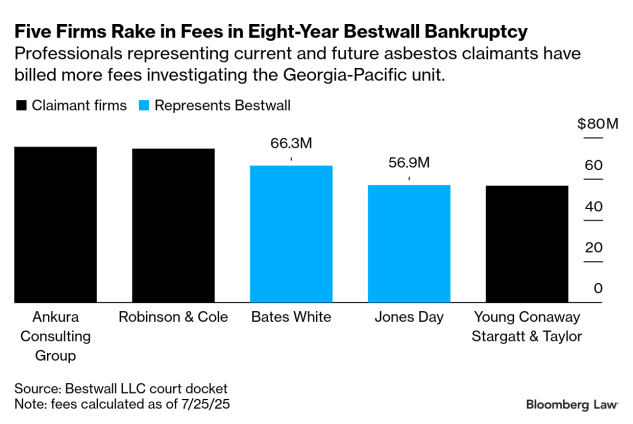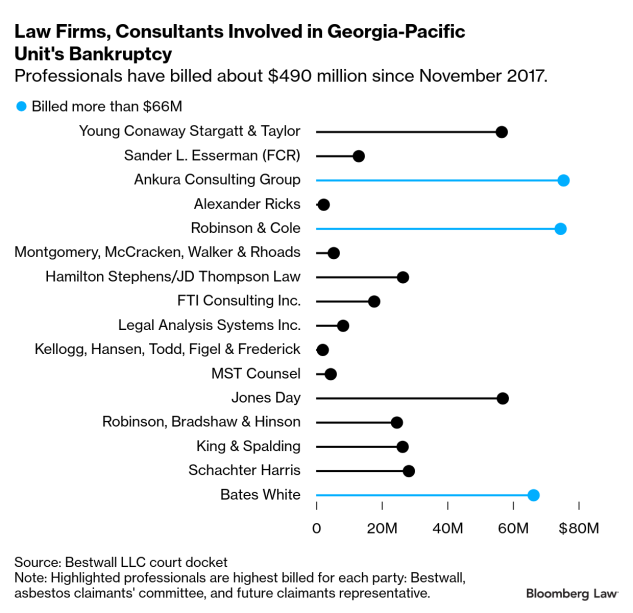Lawyers and financial advisers working on a Georgia-Pacific unit’s bankruptcy have billed almost $490 million over nearly eight years, but bankruptcy professionals say that’s not unusually high for a case that’s trying to settle with tens of thousands of people holding asbestos claims.
Bestwall LLC’s case—the longest-running asbestos bankruptcy in the past decade—shows how professionals can earn handsome paydays even as people with personal injury and wrongful death claims remain in the dark about whether and when they’ll receive payouts. Lawyers and advisers are paid before other creditors in bankruptcies.
Georgia-Pacific created Bestwall and placed it in bankruptcy in November 2017 to address mass tort liabilities from claims that the manufacturer’s products contained asbestos that caused cancer. A proposed bankruptcy plan would create a $1 billion trust to compensate the claimants. There are at least 64,000 claims, according to court records.
Despite the hefty legal bill, which isn’t unusual for a complex bankruptcy, the benefits for claimants could outweigh the costs if a judge approves the deal, attorneys and academics said.
The cost-to-benefit ratio in prior Chapter 11 cases set a precedent for the Bestwall fees, they said.
“Unless Congress does something that changes the bankruptcy code, the administrative claims in bankruptcy cases of professionals are going to be high and they’re also going to be higher priority than pretty much anything else,” said Greg Jones, a partner at Stradling Yocca Carlson & Rauth LLP who focuses on bankruptcy and restructuring.
The case could wrap up in December, when a judge is scheduled to consider the proposal. Meanwhile, a committee representing claimants is appealing its failed attempt to dismiss the bankruptcy on the grounds that it was filed in bad faith.
Attorneys for Georgia-Pacific and Bestwall didn’t respond to requests for comment.
Parsing the Fees
Some large debtors bring in fee examiners to review administrative charges, but Bestwall doesn’t have one.
“Even an aggressive fee examiner is looking at reducing fees about five to seven percent across the board,” said Robert Keach, an attorney at Verrill Dana LLP who was the fee examiner in the first bankruptcy for Johnson & Johnson unit LTL Management LLC.
Chapter 11 debtors must cover not only their own legal fees, but also those incurred by official committees representing junior creditors, like asbestos claimants.
Read More: Georgia-Pacific Paid Parent Koch $1.8 Billion Dividend in 2024
It’s uncommon for creditors to oppose fees partly due to fears of retaliation from debtors’ attorneys who may challenge creditor lawyers’ bills in response, professionals said. They also noted that creditors may not object because they know the Justice Department’s bankruptcy watchdog often raises fee concerns even if creditors don’t.
“Taking a stand on fees may not get you that far and it may get you in trouble,” Keach noted.
Bestwall is the first asbestos bankruptcy to attempt the controversial legal strategy also known as the Texas Two-Step, which involves a divisional merger and has prompted extensive litigation. Such cases often lead to creditor attorneys billing more than debtors’ attorneys because they spend time investigating assets, Keach said.
While Bestwall’s professionals alone have billed around $203 million since the start of the bankruptcy, future and current claimants’ professionals have requested nearly $287 million.
The future claimants’ consultant Ankura Consulting Group LLC has billed the most, seeking nearly $75.5 million.
Committee counsel Robinson & Cole LLP recorded the second highest fee amount at about $74.5 million, followed by Bestwall’s asbestos consultants, Bates White LLC, at around $66.3 million.
Bestwall’s lead law firm Jones Day and Young Conaway Stargatt & Taylor LLP, as counsel for the future claimants’ representative, round out the top five.
Additionally, Georgia-Pacific has spent about $2.9 billion to resolve more than 430,000 lawsuits since the asbestos litigation began four decades ago, according to court records.
Tens of thousands of claimants have died in that time, Bestwall attorney Noel Francisco of Jones Day said during a May hearing before the US Court of Appeals for the Fourth Circuit.
High Costs, Large Recoveries
High legal fees in large cases aren’t shocking because bankruptcy is expensive, said Nancy Rapoport, a University of Las Vegas Nevada law professor who was involved in fee matters in the Toys R Us, Caesars Entertainment Corp., and Mirant Corp. bankruptcies.
Lehman Brothers Inc., FTX Trading Ltd., and PG&E Corp. are a few of the costliest cases that provided creditors significant payouts. Lehman’s 14-year bankruptcy proceeding cost nearly $6 billion while
FTX billed nearly $1 billion in legal fees as of February. Most creditors are expected to get a 118% return on what they had on the platform when the company went bankrupt in 2022.
PG&E’s professionals billed around $540 million and established a $13.5 billion trust for fire victims after the California power company went bankrupt.
PG&E’s case presented an unusual challenge to Big Law fees, however. The fee examiner Bruce Markell, a Northwestern University law professor and former Nevada bankruptcy judge, gained court approval of a $22.4 million reduction—about 4.1%—of the overall charges.
‘Devil of Bankruptcy’
Attorney rates have increased tenfold since the 1990s, Markell said.
Sometimes, there is a “padding of fees,” he said. But since circumstances for each case vary, it’s nearly impossible to standardize, he noted.
Bankruptcy courts, and even judges within a district, have their own ways of handling fee procedures. However, professionals always get one final fee payment at the end of a case, with interim fees paid every three months.
As the case stretches on, Bestwall’s overall fee amount has drawn criticism from the committee and individual creditors who are concerned with settlement payouts, although no formal objections have been filed.
Fee issues have been “the devil of bankruptcy since its inception,” Markell said. But, he added, “bankruptcy doesn’t multiply the fees. The issues do.”
To contact the reporter on this story:
To contact the editors responsible for this story:
Learn more about Bloomberg Law or Log In to keep reading:
See Breaking News in Context
Bloomberg Law provides trusted coverage of current events enhanced with legal analysis.
Already a subscriber?
Log in to keep reading or access research tools and resources.


